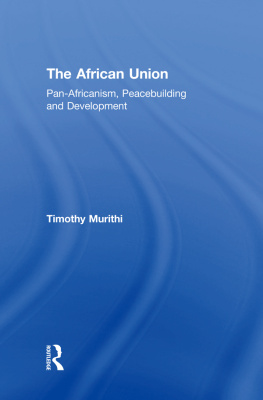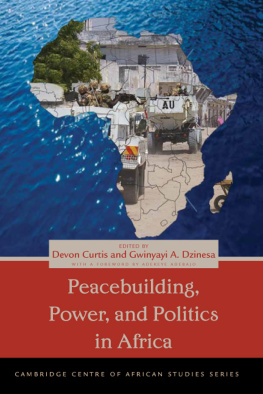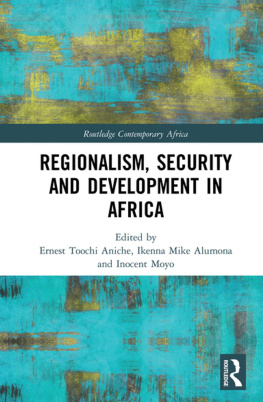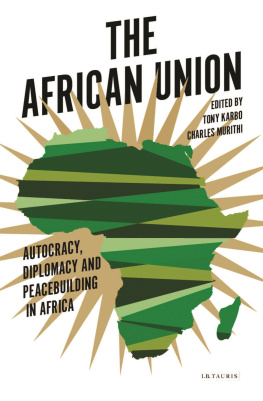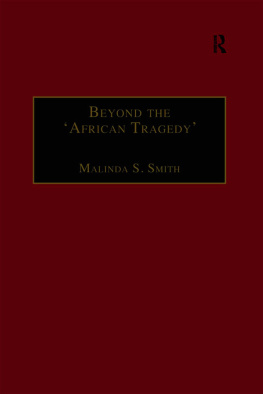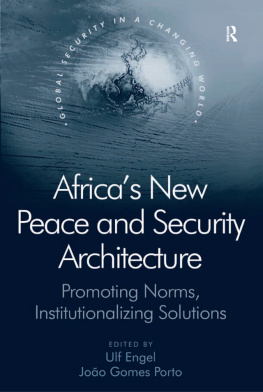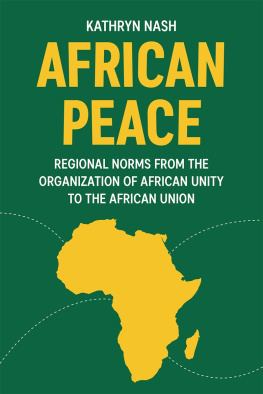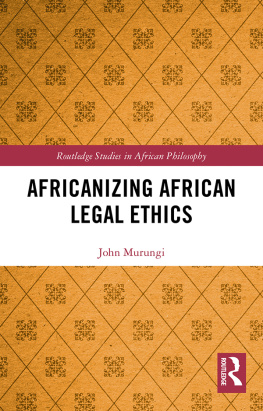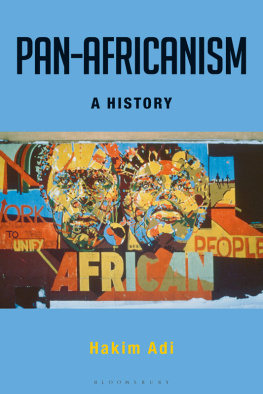THE AFRICAN UNION
This book is dedicated to my family: my parents Jeremiah and Esther Murithi, my siblings Sarah, Victor, Nicola, my nephew Remy, all members of the Kabwi and Ngaine families and to all members of the Pan-African family
The African Union
Pan-Africanism, Peacebuilding and Development
TIMOTHY MURITHI
Programme Officer
Programme in Peacemaking and Preventative Diplomacy
United Nations Institute for Training and Research (UNITAR), Switzerland
First published 2005 by Ashgate Publishing
Published 2017 by Routledge
2 Park Square, Milton Park, Abingdon, Oxon OX14 4RN
711 Third Avenue, New York, NY 10017, USA
Routledge is animprint of the Taylor & Francis Group, an informa business
Copyright Timothy Murithi 2005
Timothy Murithi has asserted his right under the Copyright, Designs and Patents Act, 1988, to be identified as author of this work.
All rights reserved. No part of this book may be reprinted or reproduced or utilised in any form or by any electronic, mechanical, or other means, now known or hereafter invented, including photocopying and recording, or in any information storage or retrieval system, without permission in writing from the publishers.
Product or corporate names may be trademarks or registered trademarks, and are used only for identification and explanation without intent to infringe.
British Library Cataloguing in Publication Data
Murithi, Timothy
The African Union : pan-Africanism, peacebuilding and development
1.African Union 2.Peace-building - Africa 3.Pan-Africanism
4.Conflict management - Africa 5.Africa - Politics and government - 1960- 6.Africa - Economic conditions - 1960-
7.Africa - Social conditions - 1960-
I.Title
327.17096
Libraryof Congress Cataloging-in-Publication Data
Murithi, Timothy.
The African Union : Pan-Africanism, peacebuilding and development / by Timothy Murithi.
p. cm.
Includes bibliographical references and index.
ISBN 0-7546-3953-3
1. African Union. 2. Africa--Politics and government--1960- 3. Pan-Africanism. 4. Peace-building--Africa. I. Title.
DT30.5.M867 2005
341.249--dc22
2005008923
ISBN 13: 978-0-7546-3953-4 (hbk)
Contents
Why write a book about the African Union? The African Union exists but African unity does not. Can the African Union address the problem of conflict and promote genuine peacebuilding across the continent? Can the African Union bring about the development that African people crave but have been denied for so long? Will the peace and development initiatives of African people and civil society be enhanced by the presence of the African Union? It is clear from the nature of these questions that the answers lie in the future. Some observers and commentators question whether the African Union is a valid project to be undertaking at this time, or just another ambitious campaign by self-seeking leaders to distract attention from the concrete problems of the continent. Again judgment will have to be postponed to a later date. What we can do in the present is examine the emergence of the African Union and critically assess whether some of the institutions and initiatives that it has put in place will address the issues mentioned above.
Africas troubled history is revealing. Over the last five hundred years Africans have not been authors of their own destiny. The legacy of slavery and colonialism has left social, psychological, economic and political imprints upon the continent, its people and the African Diaspora. In post-colonial Africa events, actors and situations have conspired to deprive the African people of the peace, development and well-being that all human beings seek. The African Union has emerged as a home grown initiative to effectively take the destiny of the continent into the hands of the African people. This book will contribute to the debate about whether the African Union can achieve this objective.
The underlying agenda of the creation of the African Union is to promote solidarity, cooperation and support among African countries and peoples in order to address the catalogue of problems that they face. Most of Africas problems can be resolved if the political will is mobilized to genuinely address the internal issues of social and political exclusion, authoritarianism, economic mismanagement and the misappropriation of state resources. These issues are the underlying causes of the political violence and conflicts that plague the continent. Poverty and the lack of respect for the human dignity of African people is also at the core of many of these disputes. This book will assess some of the institutions that the African Union has established to arrest the violence and build peace.
The African Union was also born out of the realization that in the context of a globalizing world individual states do not have the capacity to survive, at least economically, on their own. The African Union is also an effort to pool together the energies and resources of African people to with-stand and deflect the predatory and exploitative nature of current global trade and financial practices. Only when Africa has got its house in order will it be able to genuinely participate as an equal partner in the globalization process. As things stand Africa remains exploited, because its leaders and its structures of governance leave it vulnerable to such exploitation.
This book will look at whether some of the proposed programmes of the African Union, like its New Partnership for Africas Development (NEPAD) initiative, will genuinely strengthen the continents indigenous capacity for economic growth. Will NEPAD contribute towards the development and nurturing of local industries to partake in global trade, or whether it is just another noble idea with ignoble future consequences.
This book will also assess the emerging, but not fully activated, spirit of Pan-Africanism. The African Union can be viewed as the latest incarnation of the Pan-African movement which traces its roots to as far back as the seventeenth-century and the anti-slavery campaigns.
Ultimately, this book seeks to respond to the question: what is the proper role of the African Union? Enabler, supporter, facilitator, protector of the African people? Ideally, it should be all these things. In practice, the reality of politics in Africa suggests that the African Union will confront significant challenges in trying to fulfil these roles. These challenges however must be overcome if the continent is to achieve it goal of building sustainable peace and consolidating genuine development.
The structure of the book is organized as follows:
offers an introduction to the key themes of the book
provides an intellectual history of Pan-Africanism and its institutionalization through the Pan-African Congress, the Organization of African Unity and its latest incarnation as the African Union
discusses the peace and development challenges that will confront the African Union and its partners
will assess the peace and security institutions that have been established by the African Union to advance the quest for peace on the continent
examines the emerging partnership between civil society and the African Union and how this will impact on peacebuilding and development on the continent
will question previous developmental paradigms and initiatives and critically assess of the recently established New Partnership for Africas Development (NEPAD)

